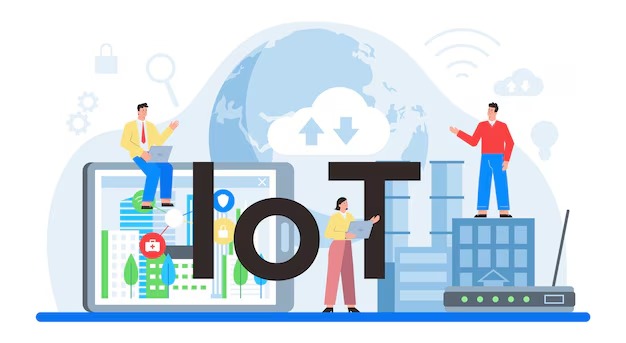Blogs
Exploring the Impact of IoT on Business Operations
Published on October 28, 2024

Author: Yiga Richard
The Internet of Things (IoT) is transforming industries by connecting devices, sensors, and systems to streamline operations and provide actionable insights. With billions of IoT-connected devices around the world, businesses are harnessing this technology to drive efficiency, improve customer experiences, and create new revenue streams. In this blog, we’ll explore how IoT is revolutionizing business operations and the specific benefits it brings to different industries.
1. Real-Time Data Collection and Analytics
One of the greatest advantages IoT brings to business operations is real-time data collection. IoT devices can gather and transmit large amounts of data from machines, equipment, and environmental conditions. With this data, businesses gain real-time insights into production efficiency, equipment status, and potential issues before they escalate. This ability to monitor assets and processes in real-time improves decision-making and allows for predictive maintenance, preventing costly downtime.
For example, in manufacturing, IoT sensors can monitor equipment performance, alerting teams to potential issues that might need attention. This leads to better resource allocation and higher operational efficiency.
2. Enhanced Asset Management and Tracking
IoT technology allows businesses to track assets, from machinery and equipment to inventory and shipments, with high precision. Sensors can be attached to assets to monitor their location, status, and usage. This is particularly valuable for logistics and supply chain management, where IoT can optimize routes, reduce losses, and ensure that goods are delivered on time.
For instance, in warehousing, IoT-enabled tags can track inventory levels in real time, making stock management more efficient and accurate. By reducing stockouts and overstocking, IoT-driven asset tracking saves time and cost, improving overall operational performance.
3. Streamlined Facility Management
IoT is transforming facility management by providing a smarter, more energy-efficient approach. Connected devices can monitor and control lighting, HVAC, and security systems, ensuring optimal usage and reducing energy costs. This is especially useful in industries with large facilities, such as retail, healthcare, and manufacturing.
For example, smart thermostats and lighting systems can adjust based on occupancy and ambient conditions, helping businesses save on energy costs. Additionally, IoT-enabled security systems can provide real-time monitoring and alerts, enhancing facility safety and reducing the need for on-site security staff.
4. Improved Employee and Workplace Safety
IoT is enhancing workplace safety by continuously monitoring environmental conditions and equipment, alerting teams to potential hazards. In industries like construction, manufacturing, and mining, wearable IoT devices can monitor workers' health metrics and detect unsafe conditions, such as gas leaks or extreme temperatures, helping prevent accidents.
Wearable IoT devices also provide insights into worker behavior and ergonomics, helping companies improve workplace layout and processes for better safety and productivity. This proactive approach to safety reduces accidents, insurance costs, and downtime, benefiting both employees and the business.
5. Enhanced Customer Experience
IoT can also transform the way businesses interact with their customers, providing personalized, real-time experiences. For instance, in retail, IoT sensors can track customer movements, preferences, and purchase patterns, enabling stores to personalize promotions and layouts based on customer behavior.
Additionally, IoT-enabled smart products, such as appliances or vehicles, allow companies to collect usage data and provide proactive maintenance reminders or software updates, enhancing customer satisfaction and engagement. By creating a more personalized and responsive experience, IoT can help build stronger customer relationships and loyalty.
6. Predictive Maintenance and Reduced Downtime
Predictive maintenance powered by IoT has become a game-changer for industries reliant on heavy equipment, such as manufacturing, energy, and logistics. IoT sensors monitor equipment health indicators—such as temperature, vibration, and pressure—to identify potential issues before they lead to costly breakdowns. This allows businesses to schedule maintenance only when necessary, reducing downtime and extending equipment lifespan.
In manufacturing, predictive maintenance can save businesses significant costs by preventing unplanned downtime. It also allows them to optimize maintenance schedules and minimize disruptions to operations.
7. New Revenue Streams and Business Models
IoT is creating opportunities for businesses to offer new services and revenue streams. For example, companies can leverage data generated by IoT devices to provide customers with subscription-based services, usage-based billing, or remote monitoring solutions. IoT-enabled products can also provide businesses with valuable insights into customer usage, enabling data-driven product development and improved customer support.
For instance, companies in the automotive industry are introducing IoT-enabled telematics services, allowing customers to track vehicle performance, receive maintenance alerts, and even access insurance discounts based on driving behavior.
8. Data-Driven Decision-Making
With the wealth of data generated by IoT devices, businesses are equipped with valuable insights to make data-driven decisions. Whether optimizing supply chain logistics, adjusting production levels based on demand forecasts, or personalizing marketing efforts, IoT data can help inform strategic decisions across departments. This data-driven approach enables organizations to be more agile and responsive to market trends, improving competitiveness.
Data from IoT devices can also be integrated with artificial intelligence (AI) and machine learning (ML) algorithms to generate predictive insights, giving businesses a competitive advantage by helping them stay ahead of industry changes.
Conclusion
IoT is transforming business operations across industries, offering unprecedented levels of connectivity, automation, and data insights. From real-time tracking and predictive maintenance to enhancing customer experiences and workplace safety, the impact of IoT on business operations is profound. As IoT technology continues to evolve, companies that embrace this digital transformation will be better positioned to thrive in a competitive and dynamic marketplace. By harnessing the power of IoT, businesses can drive efficiency, reduce costs, and unlock new opportunities for growth and innovation.